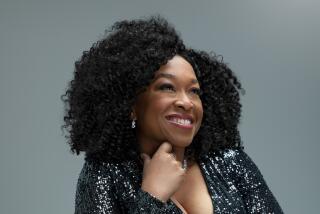Op-Ed: The firestorm over the firing of a gray-haired female news anchor in Canada

This summer, Canada has been rocked by a case that is ostensibly about a woman’s right to choose whether to dye her hair.
She isn’t just any woman. She is Lisa LaFlamme, the news anchor who, for the last decade, has been the face of the most-watched nightly news show on Canadian television.
LaFlamme is to Canadians what Barbara Walters or Katie Couric once was to Americans. She is 58, a 34-year veteran of the industry, wise, razor-sharp and quick to create a sense of intimacy with viewers — part Hoda, part Yoda.
In June, LaFlamme was unceremoniously dumped from her role at CTV, allegedly because of “massive changes to traditional broadcasting” in Canada. But across the country, a different narrative quickly took hold: LaFlamme’s boss at CTV’s parent company, Bell Media, had allegedly demanded to know who approved the decision to “let Lisa’s hair go gray,” and soon after that, she was dropped.
The anger and despair healthcare workers carry around can be set off when trifles are offered and basic needs on the job are ignored.
Journalists accused CTV of being a toxic workplace, Canadians rallied behind LaFlamme, Twitter and the rest of Canadian news media kept the story alive — and soon it took on a life of its own, a marriage of Samson and Goliath. For Bell Media, it is the stuff PR nightmares are made of, and the company, which has denied the allegations of sexism and ageism, has been in a state of continuous damage control.
Bell Media is likely taken aback by how so many people could care so much about such a commonplace story as an older woman being written out of her longtime workplace. In a way, the axing of LaFlamme is a bittersweet gift, an opening for graying women everywhere to speak up about the enduring ageism and sexism in the workplace.
Lisa LaFlamme has about 10 years on me, and I’m a little older than the man who allegedly decided she was past her best-before date. In many ways, I’m in the elusive prime of my career, the long-sought phase where confidence, experience, skill, relationships and, perhaps, wisdom are roughly on par.
It is a sweet spot that has been a literal lifetime in the making, and I am privileged to be here — the phase where I have the seniority to do the things I do best, and the self-acceptance to allow myself missteps. I speak my mind, and people often listen. I am still young enough to be planning for the next chapter, the one that will build on the foundation of everything that came before it.
Or at least, I thought I was.
I wonder now if that sweet spot was a sliver, if the prime of any woman’s career is less like a constellation, and more like a shooting star … blink and you’ll miss it. We work so hard to get to this point, the one where we finally call a cease-fire with ourselves, and then something happens to remind us that some of our progress is just an illusion, and we doubt ourselves again.
LaFlamme being tossed from the workplace has taken me back to a miserable phase of my career when I was in my 20s. I was already a doctor — privately suffering from an eating disorder, convinced I wasn’t thin enough or smart enough despite clearly being both, surrounded by men who often talked over me and appeared wildly confident despite the fact they were frequently less competent.
My childhood was filled with happy summer vacation memories — despite the odds. They’ve come flooding back as my husband and I ponder buying a cabin.
One day, I came across a book for women, written by a lawyer: “Making the Case for Yourself.” I literally pounced on that book. I grabbed it and clutched it like scripture. The minute I read those five hopeful words, I was sure someone finally understood my most private deficiency. I was my own worst critic, and I was especially vicious when it came to how I looked. I had to learn how to stop acting like the prosecution and become my own defense. It was time to switch sides, and I was going to make the case for myself.
But in my reading, my anticipation quickly turned to betrayal, then outrage as I realized … it was a diet book. It even ended with a recipe for cabbage soup I could eat all day long to keep those pounds off forever. It appeared to have been written to coach me on how to starve myself, and sadly, I already knew how to do that.
The book made an assumption that the greatest struggle of my life would be perfecting my looks. It is the message most women internalize from the time we are very young — that this is our most important currency, the real, most urgent and meaningful of our pursuits. It is no small struggle to finally dismantle that conditioned belief. We get to the point where we are finally enough for ourselves, and all too quickly we have a new terminal fault. We are deemed too old.
Companies, capturing the zeitgeist, have gleefully (and opportunistically) piled on. The apple-cheeked Wendy’s mascot is sporting gray pigtails in Canada. Dove launched a “keep the grey” campaign. Sports Illustrated announced a new cover in gray tones featuring Maye Musk, Elon’s mother.
If only ad campaigns that run with a pop culture moment could change a brutal truth: A woman’s prime in some men’s eyes will last slightly longer than a total solar eclipse.
But if there’s a silver-haired lining to all of this, it’s that Lisa LaFlamme is not having to make the case for herself all by herself. That might be one for the ages. All of them.
Jillian Horton is a writer and physician. She is the author of “We Are All Perfectly Fine: A Memoir of Love, Medicine and Healing.” @jillianhortonMD
More to Read
A cure for the common opinion
Get thought-provoking perspectives with our weekly newsletter.
You may occasionally receive promotional content from the Los Angeles Times.












